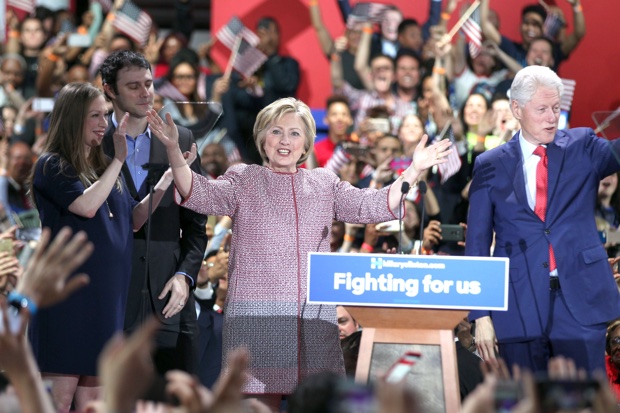The crowd at the Bernie Sanders rally in Washington Square Park last week was white, for New York. Not very white, but white for New York – even perhaps for those particular streets, where the purple flags and drapes of NYU ripple in the breeze. This reflected Bernie’s big problem: he hasn’t excited the non-white portion (almost half, nationwide) of the Democratic electorate – particularly, he has failed to impress black voters. Whether or not he could change this was the key to last night’s primary, and probably, therefore, to the Democratic race in general.
Bernie had racked up seven straight wins, in Idaho, Utah, Alaska, Hawaii, Washington, Wisconsin and Wyoming – all states with comparatively few delegates, and demographics that skew away from the Democrats’ usual coalition (the Democratic electorate in November is projected to be 24 per cent black; it was 10 per cent black in Wisconsin, low single digits in the rest). Before those, he had been hammered in more diverse states.
Conceivably, Bernie might have made New York competitive just with a massive turnout among his base of self-described ‘very liberal’ voters and young people, if it were not for New York’s status as a ‘closed’ primary, in which only people who registered as Democrats last year were eligible to vote. Beyond that, with his recent momentum, it felt like now or never for Bernie to do well in a delegate-rich and diverse state – to widen his mathematical path to the nomination, and also prove that he could be a serious standard-bearer for progressive politics in America.
After all, it has been Republicans who have typically charted (with great studiousness) a course for the White House that bypasses non-white voters. The sense that Bernie is doing the same has threatened to render his campaign an absurdity – and it was not mitigated last night: Hillary Clinton cruised to victory in the state, and, according to preliminary exit poll results, won 75 per cent and 60 per cent of the black and Hispanic votes respectively.
Bernie’s campaign had tried hard, in its way. In Washington Square Park, while ‘Stop, In The Name of Love’ blasted, young people held up flowers and cartoon Bernie masks (imagine Beavis or Butthead’s grandfather). They wore t-shirts that read, ‘Vote Sanders: He’s chill’. A white man held up a sign that exhorted Democrats to ‘fix your own racism’. Another sign, courtesy of ‘Canadians for Bernie’, read, ‘Sanders + Trudeau = World Peace’. The warm-up speakers were a mix of Hollywood celebrities and more or less unhinged trade union bosses: Tim Robbins declared that ‘now is the time for unbridled idealism!’; Rosario Dawson mused on the fact that Bernie had ‘literally walked with Martin Luther King, Jr!’; Spike Lee asked, was ‘Brooklyn in the house!?’; J. P. Patafio, of the Transport Workers Union, yelled, ‘Fuck Verizon!’ All of which was cheered loudly, but with titters in the crowd too; it was almost 30,000 people, not just humourless ideologues. But they were rapt at the same time, even pressed up against the barricades outside, filling the streets around the park, in the cold.
When Bernie took the stage about four hours in, as night fell, his voice so hoarse it sounded like a cassette tape slowing down on low batteries, he wove some civil-rights references into his standard stump-speech: African-Americans; ‘women who stood up’; Stonewall, ‘a few blocks from here’. Then he equated all these with ‘fast-food workers who stood up against McDonald’s, Burger King, and Wendy’s’, and moved on to address fracking and Henry Kissinger. Bernie was received well at Al Sharpton’s National Action Network, and visited a church in Harlem. The young activists of Black Lives Matter have gravitated towards him, and heckled the Clintons.
But all of this was too late, as well as surely too little. Hillary inaugurated her campaign almost exactly a year ago with a major speech on racial justice; Bernie, whose entire political career has unfolded in 95 per cent-white Vermont, has been behind on these issues not just in this campaign but over decades of Clinton brand-building in black communities. In the debate between the two on Thursday, Bernie seemed to dismiss his massive losses in the Deep South (among those communities that suffered and fought hardest for the franchise), saying ‘you know what, we’re out of the Deep South now, and we’re moving up’.
It fell to Hillary to make perhaps the most forthright statement on race ever uttered by a major-party frontrunner: ‘I want white people to recognise that there is systematic racism’. On Saturday, about a hundred people gathered at Mount Ararat Church in Brooklyn to hear six surrogates of Hillary’s campaign speak. They were the mothers of Trayvon Martin, Eric Garner, and other slain black youth. The strength of the feeling for Hillary among these sternly eloquent women was, like everything else about them, very moving; as Gwen Carr, Garner’s mother, put it, ‘Hillary Clinton and I have a personal connection because she reached out to me…her staff didn’t take the notes, she took the notes. And she followed up…So yes, I endorse her. But she endorsed us first’. Sybrina Fulton, Martin’s mother said, ‘Secretary Clinton was the only candidate who showed us that she cared’. If Hillary stands for the ‘politics as usual’ that Bernie and his campaign have rejected, then this – the reaching out, the note-taking, the nodding, the following up – is a part of that too, and one he may regret passing over.





Comments